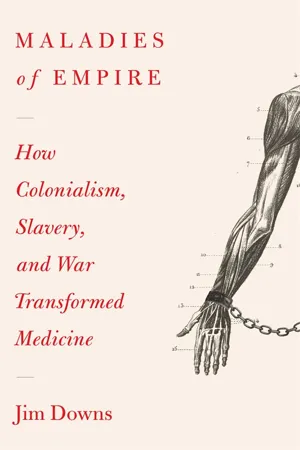
- English
- ePUB (mobile friendly)
- Available on iOS & Android
About this book
A sweeping global history that looks beyond European urban centers to show how slavery, colonialism, and war propelled the development of modern medicine.
Most stories of medical progress come with ready-made heroes. John Snow traced the origins of London's 1854 cholera outbreak to a water pump, leading to the birth of epidemiology. Florence Nightingale's contributions to the care of soldiers in the Crimean War revolutionized medical hygiene, transforming hospitals from crucibles of infection to sanctuaries of recuperation. Yet histories of individual innovators ignore many key sources of medical knowledge, especially when it comes to the science of infectious disease.
Reexamining the foundations of modern medicine, Jim Downs shows that the study of infectious disease depended crucially on the unrecognized contributions of nonconsenting subjects—conscripted soldiers, enslaved people, and subjects of empire. Plantations, slave ships, and battlefields were the laboratories in which physicians came to understand the spread of disease. Military doctors learned about the importance of air quality by monitoring Africans confined to the bottom of slave ships. Statisticians charted cholera outbreaks by surveilling Muslims in British-dominated territories returning from their annual pilgrimage. The field hospitals of the Crimean War and the US Civil War were carefully observed experiments in disease transmission.
The scientific knowledge derived from discarding and exploiting human life is now the basis of our ability to protect humanity from epidemics. Boldly argued and eye-opening, Maladies of Empire gives a full account of the true price of medical progress.
Frequently asked questions
- Essential is ideal for learners and professionals who enjoy exploring a wide range of subjects. Access the Essential Library with 800,000+ trusted titles and best-sellers across business, personal growth, and the humanities. Includes unlimited reading time and Standard Read Aloud voice.
- Complete: Perfect for advanced learners and researchers needing full, unrestricted access. Unlock 1.4M+ books across hundreds of subjects, including academic and specialized titles. The Complete Plan also includes advanced features like Premium Read Aloud and Research Assistant.
Please note we cannot support devices running on iOS 13 and Android 7 or earlier. Learn more about using the app.
Information
Table of contents
- Cover
- Title Page
- Copyright
- Dedication
- Contents
- Introduction
- 1. Crowded Places: Slave Ships, Prisons, and Fresh Air
- 2. Missing Persons: The Decline of Contagion Theory and the Rise of Epidemiology
- 3. Epidemiology’s Voice: Tracing Fever in Cape Verde
- 4. Recordkeeping: Epidemiological Practices in the British Empire
- 5. Florence Nightingale: The Unrecognized Epidemiologist of the Crimean War and India
- 6. From Benevolence to Bigotry: The US Sanitary Commission’s Conflicted Mission
- 7. “Sing, Unburied, Sing”: Slavery, the Confederacy, and the Practice of Epidemiology
- 8. Narrative Maps: Black Troops, Muslim Pilgrims, and the Cholera Pandemic of 1865–1866
- Conclusion: The Roots of Epidemiology
- Notes
- Acknowledgments
- Index